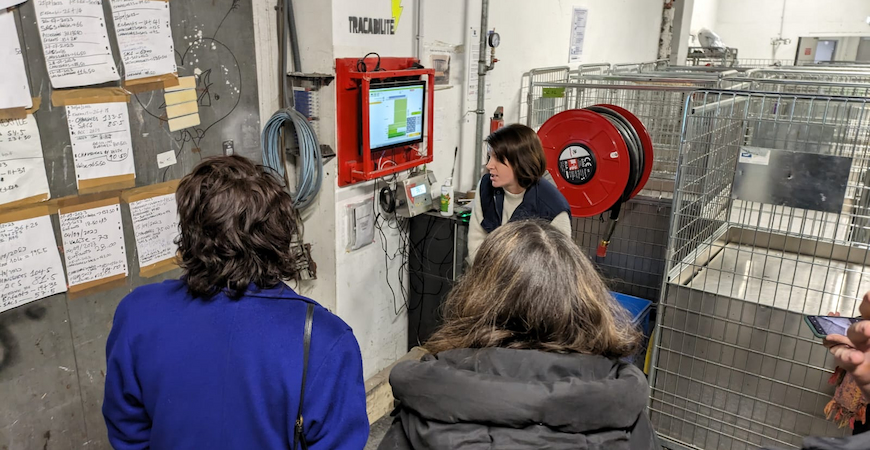Traceability: a strategic asset for Emmaus initiatives?
Increasingly in Europe, politicians are aiming to introduce a system of extended producer responsibility (EPR) to manage waste and promote reuse in different sectors, such as electronics, textiles and furniture. In practice, this means that manufacturers of new products will become financially responsible for managing the products at the end of their lifecycle. As a result, our Emmaus groups can get involved and benefit from funding or facilities for our work thanks to the traceability system.
To find out more, we met Elsa Delouche, Traceability and Reuse Officer at Emmaus France. Elsa supports groups towards establishing the traceability of donations.
Could you tell us what traceability is and what types of “products” it applies to?
Definitions are varied, but the one I use, on which there seems to be a consensus, is as follows: an organisation system and tools that allow us to obtain data on activities, an efficient process (simple, accessible and stable).
In certain sectors, the data is expected by eco-organisations*, and provides access to different opportunities (financial support, free return of waste, access to deposits). In France (and shortly in all EU countries), this will apply to furniture and furnishings, toys and games, DIY and garden equipment, household appliances, sports and leisure goods, along with textiles, bedding and footwear.
What is the purpose of traceability for Emmaus groups?
I see traceability as an opportunity for groups and the movement:
- It encourages us to improve working conditions by questioning the tools used, workstation safety and ergonomics.
- It allows people to diversify their tasks (for example, using weighing equipment).
- It encourages people to develop their skills (e.g. mastering software).
- It contributes to steering the business and decision-making by providing objective, reliable data.
- It enables us to promote our activities in the field to external stakeholders and partners, and to ensure that they are aware of the volume of donations received and processed.
- It confirms Emmaus’ position in the reuse sector through reliable, quantitative data, fuelling the advocacy work carried out by Emmaus France and Emmaus Europe.
How and why was traceability introduced in our groups? How do the groups use it and what work does it entail?
The Emmaus France Federation promotes the freedom of groups to decide whether to introduce traceability or not. Its mission is to raise awareness among groups so that they can make an informed choice (the benefits or otherwise that they could enjoy). Furthermore, it encourages each group to define its own method, it does not advocate a single method. As a result, a wide variety of practices can be observed today:
- On the choice of sectors tracked: track all sectors or select a few (often depending on the effort/gain ratio).
- Regarding the method chosen: weighing? Counting? By combining both depending on the sector?
- In terms of tools: paper materials? Software? A combination of both?
Traceability does not necessarily entail additional work; it all depends on the method and tools chosen by the group. Similarly, it is not a question of creating new tasks or developing our traditional reuse activities. The aim is to find a system to collect data on the key stages of our activity, collecting it during the activity, and then finding the tools to make it easier to use the data.
In our group, we have always believed that it was very important to be able to provide reliable data about what we do with the waste we manage. We see this as an obligation to the public and to the public and private entities that place their trust in us to collect and manage waste.There are an increasing number of obligations to ensure the traceability of the waste we manage. For calls for tender launched by public authorities for the collection of textiles this is compulsory, and current legislation is increasing the obligations of waste managers.
For the past four years, we have been processing environmental documents electronically with public authorities. Today, a waste treatment contract must be signed with the entity generating the waste in order to collect it with our lorries, and we must have an identification document in the collection vehicle.
In addition, in the case of hazardous waste, we have to prepare a consignment note for each type of waste to be transported (each code requires a different consignment note). This notification enables us to draw up the documents to be carried by the lorry transporting the hazardous waste.
The requirements of European regulations and the presence of SCRAP (Scrap metal) mean that this issue will be essential in meeting the needs of public administrations and community systems, as well as public demand for information.
* In France (under the “polluter pays” principle) this is the name given to organisations that are financed by manufacturers to take care of managing the end-of-life of the equipment they put on the market.

Traceability at Emmaus Défi (France). Credit: Emmaus Europe.



